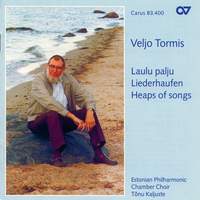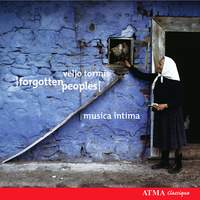Obituary,
Veljo Tormis (1930-2017)
 The Estonian composer Veljo Tormis has died aged 86. Along with Arvo Pärt he was widely considered to be one of the most influential and original voices in Estonian music as well as a leading light in the revival of Baltic choral music during the late twentieth century.
The Estonian composer Veljo Tormis has died aged 86. Along with Arvo Pärt he was widely considered to be one of the most influential and original voices in Estonian music as well as a leading light in the revival of Baltic choral music during the late twentieth century.
The son of a choral director and organist, Tormis was born on 7th August 1930 in a small village in Kuusalu, northern Estonia; displaying a fascination with the sonorities of choir and organ from an early age, he initially intended to make a career as an organist (in an interview with Toccata Classics back in 2000, he cites educational restrictions imposed by Stalin as the primary reason for his decision to abandon a performance career in favour of composition). Having abandoned his ambitions to follow in his father’s footsteps, Tormis went on to study composition at the conservatoires of Tallinn and Moscow, where he developed a passionate interest in Baltic choral music and ethnomusicology. Though he experimented with orchestral music, film scores and opera as a student and in the years immediately after graduation, choral writing and the folk-song traditions of his native country would remain his chief inspiration over the course of a forty-year career as a composer; known for his modesty and self-effacement, he once remarked that ‘It is not I who makes use of folk music – folk music makes use of me’. A hugely prolific composer, the bulk of his output was for unaccompanied choral forces, though he often supplemented them with traditional instruments such as the shaman-drum, kantele, and Jew’s harp. He considered the Estonian Calendar Songs (written in the mid-1960s) to be his first large-scale mature work, with other notable successes including the searing anti-war cantata Curse Upon Iron (1972) and the six-part cycle Forgotten Peoples (twenty years in the making), celebrating the legacies of numerous ‘dying generations’ from the Baltic states.
During the Soviet occupation of Estonia, Tormis’s fascination with folk traditions led to a shifting and often uneasy relationship with the authorities: whilst his early experiments in the area were largely in tune with official sentiments regarding formalism and simplicity, the 1960s and 70s saw him increasingly constricted by accusations of dissidence and nationalism in his music. Following the restoration of Estonian independence in 1991, Tormis’s work swiftly achieved popularity beyond Estonia and Russia; commissions from The King’s Singers (Piispa ja Pakana [The Bishop and the Pagan], in 1993) and The Hilliard Ensemble (Kullervo’s Message, in 1994) followed, with numerous discs devoted to his music appearing over the next two decades from ensembles including the Estonian Radio Choir, the Holst Singers, Musica Intima, the Hilliards, and the Tapiola Choir. His few orchestral works have been championed by his compatriots Neeme and Paavo Järvi, with the latter recording his early Overture No. 2 alongside Shostakovich’s Tenth Symphony in order to highlight the parallels between the two composers as they struggled to maintain creative integrity under Soviet rule.
Torvis retired from composition in 2000, leaving a legacy of over 500 works. He died in Tallinn on Saturday, and is survived by his wife Lea (the librettist of his large-scale cantata Estonian Ballads) and their son Tonu.
Recordings of works by Veljo Tormis
Estonian Philharmonic Chamber Choir, Tonu Kaljuste
Available Formats: CD, MP3, FLAC
Orphei Drängar male-voice choir, Cecilia Rydinger Alin
Available Formats: SACD, MP3, FLAC, Hi-Res FLAC
Holst Singers, Stephen Layton
Available Formats: CD, MP3, FLAC
Svanholm Singers, Sofia Söderberg Eberhard
Available Formats: CD, MP3, FLAC
Musica Intima
Available Formats: CD, MP3, FLAC
Cincinnati Symphony Orchestra, Paavo Jarvi
Available Format: CD








